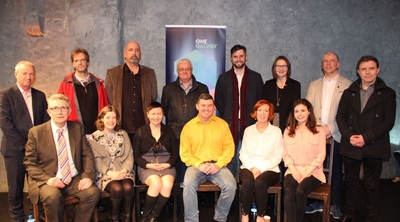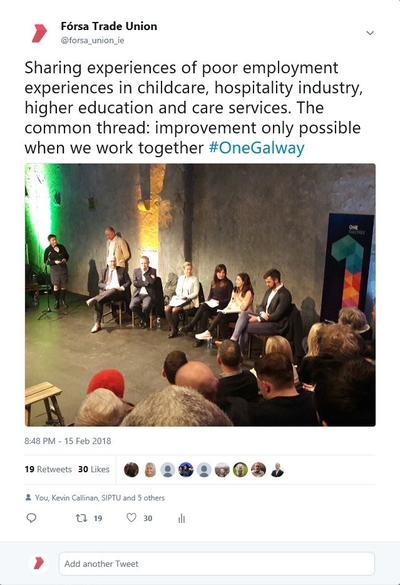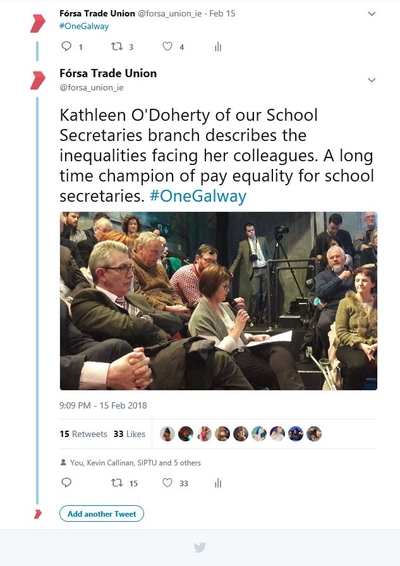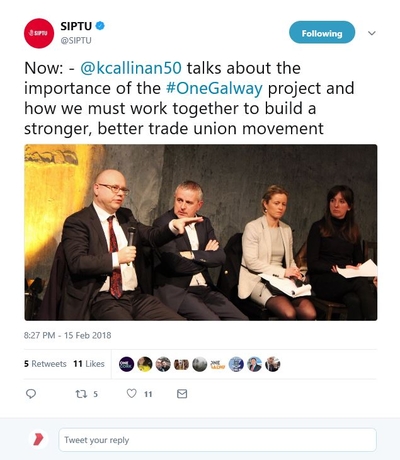Stage notes on addiction
Fórsa member Lisa Walsh readies for tour of new play
by Niall Shanahan
Love In The Wild is a new play written by Lisa Walsh, and opens next month at the Axis theatre in Ballymun. Lisa is a member of Fórsa and a social worker in child protection services. We met last week to talk about her inspiration for the play, its development from page to stage, and her desire to challenge the stigma of addiction.
Love In The Wild is a new play written by Lisa Walsh, and opens next month at the Axis theatre in Ballymun. Lisa is a member of Fórsa and qualified as a social worker as a mature student in 1999. She is currently working in child protection having previously worked as a medical social worker and an addiction worker.
We met last week to talk about her inspiration for the play, its development from page to stage, and her desire to challenge the stigma of addiction.
“The play is a one-man show about a man called Ger Duffy. He’s from Ballymun on Dublin’s north side. He’s on a methadone programme and he’s journeying through addiction and through big changes in his life.
“He has a strong connection to wildlife and nature, which helps explain how he sees the world, a way that’s quite different to how most people see it.
“The play is about love, it’s about judgment but hopefully it’s also about redemption. He’s not the stereotype of an addict, there are many layers to Ger and many layers to his story,” Lisa explained.
Inspiration
Ger’s experience was informed and inspired by Lisa’s work in addiction services over the last 20 years. While taking part in a creative writing course five years ago, Lisa recalled a story she’d heard about one addict’s experience of visiting Ballymun swimming pool 20 years previously.
“The swimming pool was a huge feature of life for anyone who grew up in Ballymun. Swimming and Chester slices - the cakes we had after we went swimming – were a big part of the Ballymun childhood.
“He went back as an adult for a swim but he left because he became very self-conscious of being - as he called himself - a ‘junkie’. It stayed with me and came back to me when I started writing,” she said.
The play has toured in a number of addiction centres in Dublin. Lisa said the response to those performances helped to inform the development of the play. “One man told me ‘We’ve all had that walk of shame, where we were walked out of places, security man would come over and put his hand on your shoulder.’ When he described that I knew we were on to something, because it’s trying to give a voice to that experience.”
Lisa said it made her think about Ballymun and the experience of stigma. “I grew up with a lot of stigma myself, my mam had addiction problems. When I started to write lots of things came back to me, like my experience of being a little girl with my mam, and the way people treated her, and later looking at the experience of people when I worked in addiction services. It’s why I was drawn to social work in the first place.”
Love in the Wild is performed by Anto Seery, directed by Peter Sheridan and produced by Sheila & Peter Sheridan.
The play opens in the Axis theatre in Ballymun on Thursday 8th March (International Women's Day) and will tour throughout March in a number of Dublin venues.
Watch the trailer here.
More information on dates, venues and booking here.

Love in the Wild is performed by Anto Seery
 |
|
Barrier to progress on section 39 pay removed
by Bernard Harbor & Niall Shanahan
Fórsa can now engage in a process to deal with pay restoration in ‘section 39’ agencies after other organisations in the sector finally agreed to sign up. The progress followed talks at the Workplace Relations Commission (WRC) this week.
Fórsa can now engage in a process to deal with pay restoration in ‘section 39’ agencies after other organisations in the sector finally agreed to sign up. The progress followed talks at the Workplace Relations Commission (WRC) this week.
Last week, Fórsa signalled its intention to engage with a HSE review of pay policy in the agencies, which are funded by the public health service, but which operate independently of the HSE. Now that others have followed suit, the process – which was first mooted by the Department of Health – will get underway.
Fórsa lifted its threat of industrial action in the sector last week, pending the outcome of the review, which the health department said would be concluded as a matter of urgency after an evidence-gathering exercise to establish the facts about which agencies had cut pay during the crisis and which had since begun to restore incomes.
The HSE review, which will cover publicly-funded organisations that have “sizable staffing,” will also consider the financial implications of adjusting pay in each organisation, taking account of all sources of funding. The final report will be assessed by the department, and the WRC will assist with implementation.
Previously, Fórsa’s Health and Welfare division had sanctioned industrial action, and had moved to identify agencies that have failed to restore recession-era pay cuts despite having relatively robust funding streams.
Éamonn Donnelly, head of Fórsa’s Health & Welfare division, said the commitment to propose appropriate plans for phased resolution was crucial to resolving the dispute. “We began our ‘Caring At What Cost?’ campaign to restore pay in section 39 agencies more than two years ago. We have argued that these workers cannot be left behind when workers in both the public and private sectors are seeing a consistent pattern of pay improvement,” he said.
Mr Donnelly added that the role of the WRC in the dispute has already been significant, not least in helping others understand the implications of industrial action in the more vulnerable section 39 agencies. “A number of employers in the sector have refused to participate in the WRC. We have argued that willingness to participate in the WRC should be a condition of public funding for section 39s,” he said.
Fórsa’s divisional executive has acknowledged that pay restoration across section 39 agencies is more complex than in the mainstream public service, because voluntary and community organisations have different funding arrangements. Essentially, some agencies are better able to fund pay restoration than others.
But the union says a significant number of agencies have failed to act, even though they have the money to do so.
Fórsa official Catherine Keogh was among the union representatives who gave evidence on the issue to the Oireachtas health committee last week.
Childcare price disparities grow
by Diarmaid Mac A Bhaird
The cost of childcare in Dublin is significantly higher than in other parts of the country, according to a new report. Leitrim had the lowest average full-time childcare costs, while Dun Laoighaire-Rathdown is the most expensive.
The cost of childcare in Dublin is significantly higher than in other parts of the country, according to a new report. The study of the affordability of childcare in Ireland finds that full-time childcare for one child in Fingal costs 40% of a medium-earning worker’s net income.
Published by the union-backed Nevin Economic Research Institute (NERI), the study also found that full-time childcare for two children anywhere in Dublin costs more than the net income of a minimum wage earner.
The report examined part-time and full-time childcare costs for one-parent families with one child, and households with two children and two earners. Leitrim had the lowest average full-time childcare costs, while Dun Laoighaire-Rathdown is the most expensive.
Rural counties generally had much lower childcare costs, but the report warned that a national 4.3% rise in the price of childcare “masks” regional disparities.
The study also discusses the wider economic repercussions of the high cost of childcare in Ireland. The authors speculate that it has a detrimental effect on employment because it limits participation in the workforce.
“Ireland has some of the highest costs for full-time childcare as a proportion of disposable income in the OECD and one of the lowest spends on early childhood education as a proportion of GDP,” it says. It also suggests that increased spending on early childhood education results in long-term economic gains.
Last December, an advisory note on pay bargaining by ICTU’s Private Sector Committee highlighted “excessive” childcare costs. IMPACT – one of the three unions that recently merged to create Fórsa – had earlier made a budget submission, which called for increased spending on early childhood education following years of underinvestment.
State-employed GPs needed
by Bernard Harbor
Fórsa has called for the introduction of state-employed general practitioners (GPs) as well as consultants who are exclusively employed in public hospitals.
Fórsa has called for the introduction of state-employed general practitioners (GPs) as well as consultants who are exclusively employed in public hospitals. In a submission to the health department’s ‘independent review of private practise in public hospitals,’ the union says citizens should not be obliged to access the public health service via a GP in private practise.
The paper hints that there would be a significant cost attached to employing ‘public-only’ doctors in both hospitals and community surgeries. But it says taxpayers would be willing to fund a system where “citizens had access to an equitable health system in which they could place their trust.”
The union underscored its support for the Sláintecare report, which calls for a universal, accessible and single-tier health service. The report has won cross-party support. Fórsa also expressed its support for a health system “largely founded on strong community health structures that maximise the skills and strength of health and social care professionals.
The submission also calls for hospital clusters to be based on geographical and demographic realities, rather than “the academic pathways of medics.”
Fórsa meets Pay Commission
by Bernard Harbor
The Public Service Pay Commission (PSPC) says it has received a large number of submissions from unions on the issue of civil and public service recruitment and retention issues. These include submissions from Fórsa on problems in the civil service and among health and social care professionals.
The Public Service Pay Commission (PSPC) says it has received a large number of submissions from unions on the issue of civil and public service recruitment and retention issues. These include submissions from Fórsa on problems in the civil service and among health and social care professionals.
At a recent meeting with unions and officials from the Department of Public Expenditure and Reform (DPER), the PSPC said it had now sought submissions from public service employers. It has also commissioned independent research.
The Commission says it is not contemplating oral presentations at this stage, but it may seek clarification of aspects of the submissions it has received.
Last November, the PSPC issued a written statement setting out its approach to the work. It aims to report on issues relating to nursing, consultants and junior doctors by the end of June 2018, and to report on other staff groups outlined in its initial report by the end of this year.
In a related development, the finance minister ruled out the introduction of Dublin allowances when he spoke to the Oireachtas finance committee last week. Paschal Donohoe told the committee that staff retention was a bigger problem than recruitment, particularly in the capital.
Read the PSPC statement of approach here.
Twilight talks underway at last
by Bernard Harbor
The union has had a preliminary meeting with the HSE to discuss the restoration of ‘twilight’ payments for Fórsa grades.
The union has had a preliminary meeting with the HSE to discuss the restoration of ‘twilight’ payments for Fórsa grades.
The payment – which sees staff paid at ‘time and one-sixth’ for working between six and eight o’clock in the evening – was discontinued in 2011. It was subsequently restored in some areas of nursing, but not for clerical staff of social care workers.
Fórsa tabled the issue at last years’ pay talks, which led to the Public Service Stability Agreement. The deal included a commitment to a process to deal with the union’s claim.
Trade unions and students launch One Galway
The project is a collaborative initiative comprising trade and student unions operating in the Galway area.
by Niall Shanahan
The ONE Galway initiative was launched last week (Thursday 15th February) with a packed house at the Mick Lally Theatre in Galway City.

The ONE Galway initiative was launched last week (Thursday 15th February) with a packed house at the Mick Lally Theatre in Galway City.
The project is a collaborative initiative comprising trade and student unions operating in the Galway area, supported by the Irish Congress of Trade Unions and the Galway Council of Trade Unions.
Fórsa deputy general secretary Kevin Callinan, who was one of the speakers at the event, explained: “The aim of the project is to foster a deeper engagement and collaboration between trade unions, student unions and community groups at workplace and societal levels to organise, campaign, educate and communicate with workers and the wider community.
“Building on the successful model established by the ONE Cork initiative, launched in 2016, ONE Galway is about organising workers, their families and communities to influence change and create a future within which there is access to decent work, decent pay and a decent standard of living for all,” he said.
Precarious work
The initial campaign focus for ONE Galway will be on precariousness and the exploitation of workers. The launch event featured a strong presentation on the issue from Dr Michelle O’Sullivan of the University of Limerick.
In her presentation, Dr O’Sullivan said “Precariousness, at its heart, is about uncertainty, and every problem, every poor outcome that workers have is because of uncertainty. Whether its hours, job or social insecurity, it’s about uncertainty.”
Dr O’Sullivan said many employers like to think of full-time, permanent jobs as something “of the past” and said she was “highly sceptical” when employers claimed that millennials were no longer interested in full-time, permanent jobs. She said it was important to challenge the claim that more secure working arrangements was a thing of the past.
Members of the audience joined the discussion to share their experiences of poor quality employment in childcare, the hospitality industry, higher education and in care services. Most of the contributions emphasised that improvement is only possible when people work together to secure them.
Campaigns
While similar to the Cork initiative, ONE Galway’s focus lies in a broader organisational engagement from the outset, where student unions are working alongside their trade union counterparts on campaigns such as housing needs, in addition to the campaign focus on precarious working.
Joe Cunningham, the general secretary designate of SIPTU, said: “ONE Galway will also work to better equip and increase the capacity of the trade union movement in Galway city and county to deal together with the many different challenges which face workers, particularly students, younger workers and those from our migrant communities.”
Kevin added: “It’s about consolidating the strength, resources and expertise locally of all these organisations and building a stronger network to improve living and working conditions and achieve significant gains for all workers through greater trade union and civic participation.”
  
Fórsa audio news bulletin
|
Community health structures under discussion
by Bernard Harbor
Talks on staffing and structural issues related to the roll-out of new primary and community health care structures got underway at the end of last month. A high-level working group will oversee the talks.
Talks on staffing and structural issues related to the roll-out of new primary and community health care structures got underway at the end of last month. Nine new ‘community healthcare organisations’ (CHOs) have been put in place to manage and deliver the provision of primary and community care services across the country.
Fórsa met the HSE last month to set a work programme and schedule for the negotiations, which will deal with management and staffing structures, qualifications and reporting relationships. The union agreed to enter talks to ensure that they were conducted in a structured environment where representatives of all relevant staff groups and categories could be heard.
The talks, which are likely to be complex, will be overseen by a high-level working groups, which will include senior Fórsa representatives.
‘Room to improve’ on gender pay reporting - Eurofound
by Niall Shanahan
Report says evaluations in the four sample EU states point to a ‘bumpy ride’ in terms of gender pay gap reporting compliance.
As the focus on the gender pay gap continues, the European Foundation (Eurofound) has produced a report reviewing the experiences in four member states – Austria, Denmark, Sweden and Finland – based on their company-level gender pay reports and audits.
The report follows the European Commission’s announcement last November that further targeted measures to improve gender pay transparency may be needed at EU level.
Eurofound’s report says evaluations in the four sample states point to a ‘bumpy ride’ in terms of compliance, at least in the initial phase of rolling out the instruments in some countries. It says there’s “room for improvement in engaging employee representatives and in raising employees’ awareness.”
It says the success of any measures depend on “the extent to which the existence of unjustified gender pay gaps is acknowledged” by the various actors involved, and their willingness to engage in a meaningful dialogue and follow-up.
The Gender Pay Gap Information Bill 2017 was accepted by the Irish Government last October. The Bill, which was backed by a strong Fórsa campaign, assigns new powers to make mandatory information disclosure schemes, compelling businesses to publish details on what they pay men and women.
After extensive lobbying on the issue last year, Fórsa continues to actively engage with stakeholders within and beyond Leinster House. Discussions between Congress and the employer group Ibec are at an advanced stage. It is now expected that an agreed employer-union position will emerge from these talks.
Fórsa continues to engage with other unions and advocacy groups on the issue.
The Eurofound report is available here.
Health groups welcome alcohol bill
by Bernard Harbor
Alcohol Action Ireland has welcomed the commencement of the Public Health (Alcohol) Bill which will, when enacted, introduce minimum pricing for alcohol, along with significant restrictions on the marketing and advertising of alcohol products.
Alcohol Action Ireland has welcomed the commencement of the Public Health (Alcohol) Bill, which happened earlier this month. The health lobby group said the move marked “a major milestone for the proposed legislation at a time when alcohol consumption in Ireland continues to rise and alcohol harms have never been more pronounced.”
Once enacted, the bill would introduce minimum pricing for alcohol, along with significant restrictions on the marketing and advertising of alcohol products.
Alcohol Ireland says the bill was significantly weakened during its Seanad stage last December, on foot of heavy lobbying from the drinks industry. Last month it emerged that 11 ministers, 15 TDs, 21 senators, and ten ministerial advisors had been lobbied.
But Alcohol Action Ireland said the bill’s central principles had remained intact, and that it had been strengthened in some areas. “What goes to Dáil Éireann now is the most progressive piece of public health legislation advanced by any government in recent times,” according to its head of communications and advocacy Eunan Mckinney.
The bill has widespread support from health groups and children’s’ advocates. As well as Alcohol Action Ireland, they include Barnardo’s, the Royal College of Physicians of Ireland, the Irish Heart Foundation and the Irish Cancer Society.
Special Olympics volunteers wanted
by Diarmaid Mac A Bhaird
The Special Olympics Ireland games are fast approaching and volunteers are needed.
A call for 2,500 volunteers to work at this summer’s Special Olympics Ireland games has been launched. The games, which will feature over 1,600 athletes, are taking place in Dublin from the 14th-16th June.
Last month’s high-profile launch of the volunteer drive featured Dublin forward Dean Rock, as well as some of the athletes who will be competing at the games. The call for volunteers is being championed by Maria Ryan, a former PSEU president.
Maria has called on Fórsa members to get involved in the games and to sign up to volunteer.
The three day event will be staged in venues around the capital including the Sport Ireland national sports campus in Blanchardstown. Volunteers for the event will be based in either DCU or UCD for the duration of the three days, and these institutions are among the numerous organisations getting behind the games.
You can volunteer HERE.
Survey results: Will a robot take your job?
In the last edition of the news bulletin we asked Fórsa members if they had concerns that a robot might eventually take over their job.
In the last edition of the news bulletin we asked Fórsa members if they had concerns that a robot might eventually take over their job.
Of those who took the survey, 51% of respondents said they weren't worried about their own job, but they were concerned for others, while 41% confidently stated that a robot could not do their job.
A few people have genuine concerns, with just 8% stating that their job is likely to be automated in the future.
The automation of work and the development of Artificial Intelligence (AI) technology is an issue of growing interest for Fórsa. Both developments present huge challenges for workers and unions, and we will bring you more on this in the coming months as part of the Fórsa Insights podcast series.
Fórsa FAQs
your questions answered
|
|
|